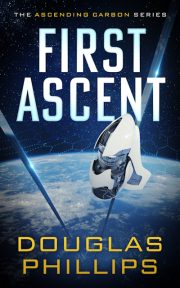Interview with Lucien Soulban, Ubisoft Montreal
by Monica Valentinelli
For my series about game writing, I’ve touched upon the similarities and differences between working on video games, tabletop RPGs, and novels. This interview with twice-nominated BAFTA writer Lucien Soulban, who works for Ubisoft Montreal, dives into all three. Lucien started writing in the stone age of games, lending his talents to tabletop RPGs and properties like Vampire: The Masquerade and Dungeons & Dragons. Additionally, he’s also written novels for Warhammer 40K and Dragonlance, as well as short stories for various horror anthologies that include Blood Lite 1, 2, & 3.
In the last decade, Lucien’s portfolio has expanded to include video games such as: Warhammer 40K: Dawn of War, Deus Ex: Human Revolution, Rainbow Six: Vegas, Far Cry 3, Far Cry 3 – Blood Dragon, Far Cry 4, and Watch Dogs 2 as writer and lead writer. He is currently working on an as-yet-to-be named project at Ubisoft Montreal.
After reading my interview with Lucien Soulban, if you’d like to learn more about him you can find out more by visiting his brand new Facebook page at: https://www.facebook.com/lsoulban
1.) What was your first writing assignment? Can you tell us about that experience?
I never expected to be a writer, to be honest. I wrote for myself and English was my best subject in school, but I had my eyes set on art and drawing. (While I wasn’t great, I was getting better slowly.) When I started writing articles for my friend’s APA (Amateur Press Association), he thought I had chops and asked me to edit roleplaying books for a company called Ianus Publications back in 1993. From there, I was given a shot at writing for the Night’s Edge RPG, a system that mixed the supernatural with Cyberpunk.
It was terrifying and exciting, because I wasn’t just writing a story: I was adding puzzle pieces to a much larger picture. It dovetailed nicely into my art, where everything I drew had a story and universe behind it. Unfortunately, the art fell to the wayside after that, which I’m not terribly proud of, and I focused more on writing. I had more finesse with words than I did with the pencil.
2.) You’ve also done some development work in RPGs. What was the first game you developed? Was that more challenging than writing for the game?
I started helping develop games for Guardians Of Order (the ‘Of’ is capitalized in their name, oddly enough), an RPG company that initially specialized in anime. At the time, their new lines included Hong Kong Action Theatre and Heaven & Earth. I inherited the development of those titles, as I did for White Wolf’s Kindred of the East, both times following the roads on a map laid out by someone else. It wasn’t until White Wolf hired me to create a new game based on Wraith: The Oblivion that I fully developed a limited-series RPG called Orpheus.
I learned a lot from that process, including the fact that I had much to learn as an editor. I wasn’t very good as one, because I made the rookie mistake of tailoring the edits to my own preferences rather than allowing the writer their artistic choices. It was a revealing process, though, because it helped cement my own checklist of do’s and don’ts, and I think helped sharpen my skills as a writer and creator. I came to realize that originality didn’t come from the novelty of the idea itself, but from the development and refining of those ideas.
3.) Do you feel that game developers need to be good writers, too? Why or why not?
I think game developers, both in tabletop and in videogames, don’t necessarily need to be good writers, but they do have to be good storytellers. At the very least, an emphasis on storytelling creates a common language. Developers need to understand how a story comes together, and how to work in partnership with the writer, to craft something cohesive and meaningful. Leave the language to the writer; that’s their fingerprint on the project. Let the writer interject their take on the material, because they’ll see new ways of representing the subject matter in a way that best works with their voice.
Conversely, writers need to trust the developers in keeping them from wandering off the path, and in trimming the fat when necessary. That’s not to say there isn’t this level of cooperation already with certain companies, or that game developers haven’t come from writing backgrounds. In fact, it helps when a developer is a writer because they understand what goes into crafting something. But is it a must? I think storytelling and critical thinking is a must for developers first and foremost.
4.) What are some of the pros/cons between working on a corebook vs. a gaming supplement?
I’ll stick with the pros because I’m a fan of both, and while corebooks seem like where the glory lies, I think my strongest work has been in the gaming supplements I wrote for Mutants & Masterminds. A corebook is something of a discovery, charting paths through a new land and trying to predict where people want to settle. You have to figure out why people will want to spend years playing your game and what you can offer them to bring and keep them together, all while creating versatility and a variety of experiences. You’re creating mythology and structure and, with a corebook, the sky’s the limit so long as you still make it accessible to your audience. I love corebooks, because it’s the flagship title of a game and the intoxicating make-it or break-it thrill of writing.
With a gaming supplement, all that heavy lifting is already done and you’re adding the finer details of the world. You go from a bird’s eye view of the terrain right down into the dirt. You can take the parts of a game that interest you and flesh them out. You’re a part of the collective who loves the world enough to add your touch while respecting the source material. Sourcebooks that add to a world have less riding on their shoulders, but still have the impulse to get it right. In both cases, though, it’s all about providing the players and game masters with enough hooks to keep them inspired.
5.) In addition to working on games, you’ve also written short stories and novels. How has working on games helped (or hindered) your fiction?
That’s an interesting question. Writing for games tends to require certain technical skills, not the least of which is a gift for straightforward exposition. That’s the one that can bite you on the ass the most. When swapping to fiction, your brain is in a different gear. It tries to make facts entertaining and to inform the reader. You can’t be coy in game writing, not unless you want niche appeal. Fictionalizing the text can obscure vital information or make weeding through the pages highly frustrating. When switching over to fiction, you can’t present the text in that way. You want to engage the reader, and not provide data like they’re speaking points. So sometimes I find myself rewriting fiction because I’m worried it reads like gaming text. The advantage, though, is that you tend to think of stories as part of a larger mythology, and each story ends up becoming a chapter in a much wider cosmology. You tend to think about how the world is structured; sometimes that can be good and sometimes it can bog you down in unnecessary detail.
6.) Are you still writing for tabletop RPGs? If so, can you talk about your latest project?
I do on occasion, mostly for Onyx Path Publishing or Green Ronin’s Mutants & Masterminds RPG. I am working on something on my own, a horror RPG, and so far it’s taking me in interesting directions. It started off as a horror novel but, after I wrote it, I realized it wasn’t living up to the potential of the idea itself. So I started working on the bible for it, and 14K words later I have the beginning of a universe with plenty of promise and plenty more to do. I might even have a nibble of interest from an unexpected corner, so that’s always good. Regardless, it’s a passion project.
7.) Your latest release for Ubisoft was Watch Dogs 2. Can you walk us through your role on the project?
I was the Senior Writer on the project with a team of seven writers in total. I was involved with helping flesh out the world stories, around which the spine of the missions were built, and with delegating the work of writing to everyone. Normally, the lead writer handles the lion’s share of the main storyline, but I wanted to make sure all the writers felt invested in the process. So everyone got a shot at writing two or more world stories, and everyone had to pitch in on the grunt work of writing lines we call barks (AI reactions to in-game stims) and the in-world conversations. I coordinated with various departments like Level Design, or asked others to coordinate with AI and programming. When all was said and done, the team wrote and we recorded over 1,200,000 words in the span of about a year and a half. This included attending motion-capture sessions for a couple of months, and traveling to San Francisco and Toronto over several weeks to record dialogs.
8.) What are some of the essential skills video game script writers need to have?
Let’s assume that knowing how to write and that having an ear for dialogs and characterization are a given. Beyond that, the writers need to be able to collaborate with a team, and have to learn how to be seen as the troubleshooter. Those are the critical skills. Writers need to understand that they aren’t the only shareholders of the vision and that the rest of the team doesn’t fall in service to “their vision.” It might be that way at a couple of companies in the industry, but for the most part, writers work at the behest of the core creative team (Creative, Art, Game, & Level Design Directors). They have to respect (or come to terms with) the artistic vision of the Art Director, with the environments of Level Design, with the flow and pillars of Game Design. It’s a shared universe, and by collaborating with the team and providing them with solutions that help you and them, you’ll come to be seen as a troubleshooter who has the answers. It’s not about shouting to be heard. It’s about giving your voice value when you do speak.
9.) What is your opinion regarding the new SFWA qualifications for game writers?
I’m grateful that the SFWA expanded its criteria to include games, though I think their criteria of $.06 a word is a touch steep since the RPG industry doesn’t pay to the scale of either the publishing or electronic industries. But, it’s not insurmountable, either, and it’s a huge step in the right direction. The new realities of being a writer should rightly allow for the creation of mythologies and for world building as their own form of a global narrative. Whether a writer contributes to fiction or an actual script, the reality is that game writers produce a ton of content that never sees print, but still helps guide their team in the creation of a living and breathing world. I’ve seen online articles focus exclusively on the humor found in written item entries for a game’s menu, for example. It goes to prove that when it comes to game writing, any and all words you write can have a market and an audience.
10.) If you had one piece of advice for writers hoping to break into video games, what would you tell them?
Let’s spare you the “play play play” version of “read read read.” Join the International Game Developers Association (IGDA) and attend their functions if you’re lucky enough to have them in your city. It’s a good way to meet the game developers in your area and to talk to producers and recruiters and find out who is looking for talent. Attend the growing number of conventions with strong narrative tracks, like the Games Developers Conference (GDC) and the East Coast Games Conference (ECGC). Start following the writers you respect and get involved in the various conversations happening on various websites. Don’t just look to the ones talking about the development of games themselves, but also to the ones discussing games from a social point of view. And finally, look at the companies crafting your favorite games and either check on their jobs available page for openings or send a quick query to them. I will say this, though. Ubisoft frequently has openings pop up on its website, but this is almost always for in-house talent, meaning if you want to work for Ubi, you’ll have to commit to the prospect of moving for the job.
•••
Monica Valentinelli writes stories, games, essays, and comics for media/tie-in properties and her original works from her studio in the Midwest. She’s a former musician of 20+ years and a graduate of the University of Wisconsin-Madison’s Creative Writing program who now writes full-time. Best known for her work in games, Monica is currently the developer for Hunter: the Vigil Second Edition, and was the lead developer/writer for the Firefly RPG line based on the Firefly TV show by Joss Whedon. Her new book The Gorramn Shiniest Dictionary and Language Guide in the ’Verse recently debuted from Titan Books. Her co-edited anthology Upside Down: Inverted Tropes in Storytelling debuted from Apex Book Company in December 2016.



